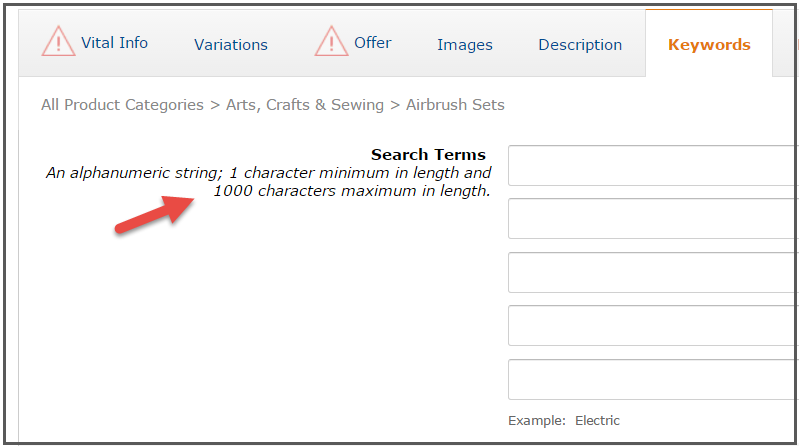
All the buzz these days is about Amazon’s new Add-A-Product interface in Seller Central. Not so much because it looks different, but because it expands the limit for search terms from 250 characters (5 lines of 50 each) to 5,000 characters (5 lines of 1,000 each). This is apparently a beta test as not every seller is currently seeing the new design or the increased search term limit and it is not showing in every category/subcategory yet.
For some, the immediate reaction is to rejoice! For others, there is a good deal of concern over Amazon’s decision to allow so much more space for keywords. I decided to take a quick survey of what some of the top-sellers on Amazon think about this change. I’ll share my thoughts at the end, but for now, here’s what others are saying.
Scott Voelker, The Amazing Seller & Author of “Amazon Selling Blueprint.”
I think the new 5,000 character search term expansion could be valuable for adding more keywords to help discover your product. The one thing to keep in mind is that just because you are allowed additional characters doesn’t mean you should use them. If sellers start to stuff keywords and receive traffic to non-converting keywords, that could hurt their listing instead of helping it. Amazon looks at conversion rates and adjusts rankings accordingly. It’s like anything else. Be smart and only use the additional space to help receive targeted traffic to your product listings.
I think that 250 characters are enough to take care of the main keywords for a particular product however having extra characters allows for those longer tail and fringe words that can help in search.
Christine Cobb, Discover FBA
I suspect that having 5,000 characters will tempt some sellers to put in keywords that are not relevant to their product. Amazon has just added this to their list of prohibited activity and so they probably are anticipating problems with unrelated products being shown for popular searches.
Debra Conrad, Bundle Basics & Advanced Strategies
Who wouldn’t love more room for keywords? It’s often frustrating to filter out keywords that may be long-tail, but you know are still valuable. After you spend time hunting down every keyword possible, it starts to feel a little personal when you have to put some of them on the chopping block.
I also see disaster looming for keyword stuffing. Amazon has lackluster monitoring when it comes to the tiny details. Seriously, how does a seller manage to fit 800 plus characters into a title? How does a seller manage to put words into titles that violate Federal Law? If Amazon can’t set up a simple system to monitor all product title configuration, how can we compete against sellers who keyword spam?
Steve Chow, My Wife Quit Her Job
The immediate pros of Amazon expanding the character limit to 5,000 is that experienced sellers who are in the know will immediately benefit which is why it’s always important to stay on top of the game. It will take a while for newer sellers to update their listings which should provide a boost early on.
The other pro is that more experienced sellers who understand the importance of keyword research will thrive and provide a means to further differentiate their product offerings. Overall, I see the new expansion as a means to further separate the pros from the newbies.
Lisa Suttora, The Ultimate Guide to Creating an Amazon Product Page That Sells
For general SEO purposes, it’s always good to include more legitimate, relevant, search keywords. In order to take advantage of this change, a seller will really need to dig in and think about all the different ways that buyers will find their products, including looking at Amazon’s suggested search terms, understand what problem/function their product solves (many buyers use “solution based searches”), as well as understanding what related searches could lead a buyer to their product.
Used correctly, this change will be beneficial for sellers who take advantage of it. For those who see this as an opportunity to abuse these expanded fields, it will continue to contribute to the degradation of the customer search and browse experience on Amazon. My concern is that this change will open up more opportunity for those who are using black hat/gray hat optimization techniques to stuff the Search Terms fields with keywords that are designed to manipulate Amazon’s search and browse function.
What Do I Think?
I, personally, believe this will cause a good number of sellers to experience lower conversion rates. People will tend to jump the gun and fill all 5,000 characters with any and every word they possibly can whether or not it is targeted to the customer/product. Because many of the terms will be arbitrary, conversions – for many sellers – could decline.
Your conversion rate is determined as a calculation of how many people visit your Amazon page vs. how many purchase. If you’re driving tons of traffic using keywords that don’t cause shoppers to buy, your conversion rate will drop because the ratio of people clicking to your page vs. those who purchase will decrease. When your conversion rate declines, Amazon takes notice and subsequently may reduce your visibility in the search results.
Just because you can have 5,000 characters for search terms doesn’t mean you should.
My recommendation is to continue to finely tune your keywords to be good matches with your target customers and the product you’re selling while staying within Amazon’s terms of service. This means NOT including:
• competitors’ brand names
• misleading keywords (aluminum if your product is plastic, for example)
• subject terms or sale announcements (#1, black Friday sale, etc.)
• disease/condition names (if you’re selling supplements)
• and more
What should you look at including with the extra space?
• Customer-based keyphrases – For example, if you’re selling backpacks, you’ll want to focus on the customers who would buy your particular type of backpack. Is yours for kids, hikers, laptop users?
• Solution-based keyphrases – Those that lead shoppers to a solution to their problem such as product descriptions (no oil popcorn popper or butt lifting jeans).
• Problem-based keyphrases – Just the opposite of solution-based, these phrases represent the problem the shopper faces, rather than the solution they hope to find. Examples include organize closet or cold runny nose.
Yes, if you’re included in this beta test and have the opportunity to add more keywords, do so IF they make sense. Keep in mind, too, that because this is a beta roll out, Amazon will be watching what sellers do. If they see that the immediate response to having more leeway with search terms is to abuse the privilege, they are likely to reverse their decision.
 Want to learn more about the keyword research process we use at Marketing Words when working with clients? My “Amazon Product Description Boot Camp” lets you watch via video as I go through every step (and more!) right before your eyes. Get it today and save 20% (code BOOTBLOG ).
Want to learn more about the keyword research process we use at Marketing Words when working with clients? My “Amazon Product Description Boot Camp” lets you watch via video as I go through every step (and more!) right before your eyes. Get it today and save 20% (code BOOTBLOG ).



I noticed this in some of my new listings and it made me nervous to use so many. So I didn’t, just stuck with what I usually do. Now I know it’s a test. I build a lot of listings and getting it right is very important. I try to spend time thinking about what a person is looking for when they type in the phrase, and look up related terms based on that.
Hey! I agree. Just shoving in keywords to fill space can turn around and bite you later 😉 You’re smart to give a good deal of thought to your search terms.
I’m curious about the usefulness of this. Amazon has always been explicit about not repeating keywords ie: if pot holder is in your title, don’t include it in your keywords. Their algorithm works without phrases and only grabs words – or so they say.
So, how does this tie in with long tail keywords? This would be a lot of repetition for some items in order to include it. I would love to hear from experts on this please.
Nobody is saying you need to repeat words. You’d do the same with long-tail keywords that you do with any others: use the individual words from the phrase without repeating between the title and search term fields.
So just to be clear… I can repeat keywords in the Search Terms field?
For example: Let’s say my product title includes these words: “BrandX Soft Toilet Paper, 4 Rolls, 400 Sheets” – Now in my Search Terms field, is it okay to repeat terms like this?:
1) Search Terms: toilet paper, toilet tissue, tissue paper, bath tissue, toilet roll, soft sheets, etc.
or best to do this?:
2) Search Terms: toilet paper tissue bath roll soft recycled sheets…
or
3) bath tissue bathroom bulk recycled big roll strong septic safe…
Also, should we leave out the commas, or is it okay to leave in there?
Any feedback on this would be appreciated! Thanks
You can put whatever you want in your Search Term fields (seriously). However, repeating keywords in the Search Term fields is a waste of space. It is not necessary. Same with commas. They are a waste of characters.
Thank you Karon,
I guess I’m a little confused as per your client’s experience mentioned below… he noticed a decline in sales after increasing his keyword quantity, however fixed the issue after removing irrelevant keywords. So, can you put whatever you want in the search terms fields, or should you be careful in choosing the most relevant keywords and entering with correct spacing? Also, is there a difference in how you should enter these search terms between a Seller and Vendor Central account? Appreciate your input! Thanks
A client (who wants to remain anonymous) gave me permission to share his experience while experimenting with the expanded search terms.
====================================
Couple weeks ago I’ve read your blogpost about Amazon increasing number of characters to 1000 in certain categories.
Last week I’ve experimented with this trying to add as much keywords as possible. Now I want to share my experience with you.
As you have predicted, instead of increasing sales, adding new keywords lead to reduction of my sales in half, and my conversion has dropped from about 20% that I usually had to 12%. Product BSR has also dropped from around 1000 to 2000. I’ve looked at the results for couple of days, and after that I’ve trimmed irrelevant keywords. I’ve returned my search terms to those that I used to have, and now my sales are gradually getting back to normal.
This experience has lead me to conclusion that I need to be very mindful about what I have in my search term fields.
==============================
Anybody else been playing around and have details to share? Would love to hear them!
Hi Al, Sorry… since blog post is about doing keyword research correctly and with relevant terms, I assumed that part was already stated 🙂 Yes, terms need to be relevant. Your questions were about using commas and repeating terms so that’s what my reply referred to. You can put anything (repeated terms and/or commas) that you want, but using repeated terms and commas is a waste of space.
And, yes, Vendor Central and Seller Central are different. You’ll need to talk with your Amazon Vendor rep to find out what the specific category and or Vendor agreement allow.
Thank you Karon… your input is really helpful!